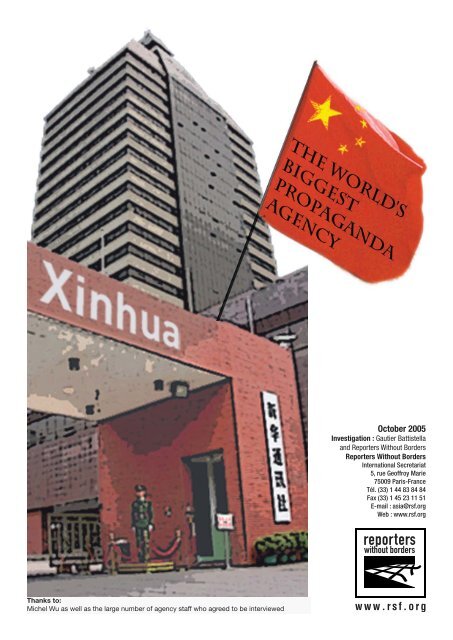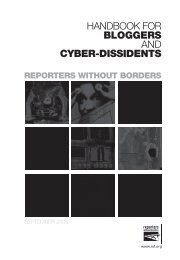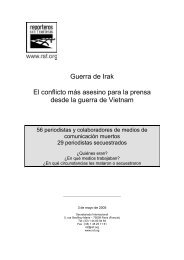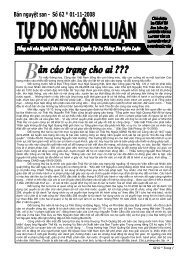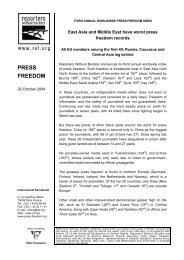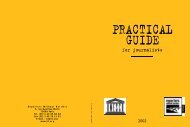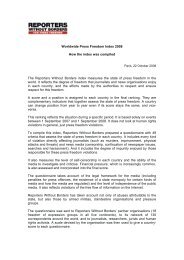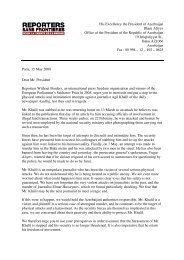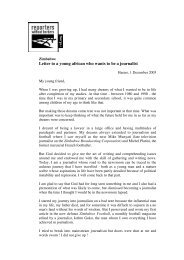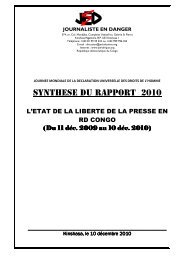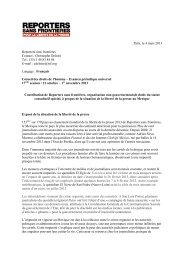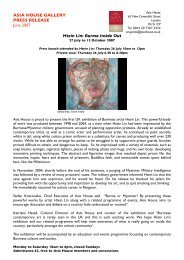The World's Biggest Propaganda Agency - Reporters Without Borders
The World's Biggest Propaganda Agency - Reporters Without Borders
The World's Biggest Propaganda Agency - Reporters Without Borders
You also want an ePaper? Increase the reach of your titles
YUMPU automatically turns print PDFs into web optimized ePapers that Google loves.
Thanks to:<br />
Michel Wu as well as the large number of agency staff who agreed to be interviewed<br />
October 2005<br />
Investigation : Gautier Battistella<br />
and <strong>Reporters</strong> <strong>Without</strong> <strong>Borders</strong><br />
<strong>Reporters</strong> <strong>Without</strong> <strong>Borders</strong><br />
International Secretariat<br />
5, rue Geoffroy Marie<br />
75009 Paris-France<br />
Tél. (33) 1 44 83 84 84<br />
Fax (33) 1 45 23 11 51<br />
E-mail : asia@rsf.org<br />
Web : www.rsf.org
er 1949, Xinhua became a state-run agency,<br />
totally subordinate to the CCP and the government.<br />
Three years from now, the Olympic flame will<br />
arrive in Beijing. Thousands of journalists from<br />
around the world will pour into the Chinese<br />
capital to cover the largest international sports<br />
event. <strong>The</strong>y will have to comply with the strict<br />
rules imposed for decades on the foreign press<br />
working in China.<br />
On the other hand, thousands of journalists<br />
working for the official Xinhua News <strong>Agency</strong><br />
will guarantee the success of these Olympic<br />
Games, in defiance of transparency. In fact,<br />
Xinhua remains at the heart of the censorship<br />
and disinformation system established by the<br />
Chinese Communist Party (CPP) since it took<br />
power in 1949.<br />
Since it was founded, it became the main outlet<br />
for the CCP’s propaganda to China’s media.<br />
Xinhua provides all media (at least 306 radio<br />
stations, 369 TV stations, 2119 newspapers<br />
and 9038 periodicals) with all major items of<br />
national and international news.<br />
<strong>The</strong> world’s biggest news agency<br />
According to official figures, the agency employs<br />
8,400 people. (Agence France-Presse by<br />
contrast has a staff of 2,000) of whom 1,900<br />
are journalists and editors. Its president, Tian<br />
Congming, has the rank of a minister. He is<br />
supported by editor-in-chief, Nan Zhenzhong<br />
and four vice-presidents, Zhang Baoshun, Ma<br />
Shengrong, Cai Mingzhao and He Dongjun.<br />
CHINA<br />
Xinhua: the world’s biggest propaganda agency<br />
<strong>The</strong> world’s largest news agency is now seen<br />
by some as a credible media - Google News<br />
for example often picks up its reports – on the<br />
same level as other international news agencies.<br />
Its huge Internet visibility (Xinhuanet.com<br />
puts out news in seven languages) and free<br />
distribution of its reports in many countries,<br />
has allowed Xinhua to become a major player<br />
in the field of international news.<br />
Xinhua currently diffuses more than 1,000 reports<br />
a day - 700 on international news and<br />
300 on internal news.<br />
This investigation report, put together by <strong>Reporters</strong><br />
<strong>Without</strong> <strong>Borders</strong> and a French journalist<br />
who worked for two years for Xinhua’s<br />
French service, shows that the agency remains<br />
an organ of propaganda in the service of the<br />
interests of the Chinese Communist Party. Its<br />
modernisation is very superficial.<br />
Xinhua’s goal is to maintain the CCP’s news<br />
monopoly. It is, according to the official definition,<br />
“the eyes, ears and voice of China”. It is<br />
the de facto largest centre of news gathering<br />
and distribution in the country. No news, especially<br />
on sensitive issues, should reach the<br />
media without the say-so of the all-powerful<br />
Xinhua.<br />
Xinhua has marked its 70th anniversary in<br />
2001. Its forerunner, the agency Red China,<br />
was founded in Ruijin District in the eastern<br />
province of Jiangxi. <strong>The</strong> agency adopted its<br />
current name in January 1937. After the founding<br />
of the People’s Republic of China in Octo-<br />
<strong>The</strong> agency’s news gathering and handling is<br />
broken up into three parts: “the headquarters”<br />
(its official name), national branches and international<br />
branches.<br />
<strong>The</strong> “headquarters” is in Beijing, at 57, Xuanwumenxidajie.<br />
It consists of “the national news<br />
department, the international news department,<br />
the national news department for overseas<br />
clients, the reference news department,<br />
the photo-journalism department, the sports<br />
news department, the broadcast news department,<br />
the online news department and the information<br />
centre.”<br />
Xinhua also has branches in 31 provinces, as<br />
well as in Hong Kong and Macao. <strong>The</strong>re are offices<br />
in around 50 Chinese cities and a bureau<br />
in Taiwan, until the authorities in Taipei closed it<br />
in April 2005 after accusing Xinhua correspondents<br />
of contributing to “discord” between Beijing<br />
and the nationalist island. Xinhua is also<br />
proud of the fact that it “possesses” branches<br />
and offices in the armed Chinese People’s Police”.<br />
Xinhua also has branches in 105 countries<br />
and eight sub-offices or editorial offices in<br />
Hong Kong, New York, Mexico, Nairobi, Cairo,<br />
Paris, Moscow and Rio de Janeiro. It is one of<br />
the rare foreign media to have a correspondent<br />
in both Pyongyang and Rangoon.<br />
But Xinhua is also above all a media empire<br />
that puts out 40 publications devoted to a variety<br />
of subjects (rural life, economy, sports, photography<br />
and so on...) Despite privatisation, as<br />
far as the Chinese media market goes, nothing<br />
is said, nothing is listened to and nothing<br />
2
CHINA<br />
Xinhua: the world’s biggest propaganda agency<br />
is seen in China without the prior agreement of<br />
the governmental agency. Anyone who defies<br />
these rules needs to watch out. <strong>The</strong> misfortune<br />
of an agency journalist, dismissed for putting<br />
out a report intended for internal consumption<br />
only, stands as a warning to all.<br />
<strong>The</strong> Xinhua’s journalists<br />
<strong>The</strong> recruitment<br />
Students are targeted from the start as potential<br />
agency journalists. Candidates are selected<br />
both for their ability – they are often the best<br />
students at university – and their obedience to<br />
the Party, since they are required to spread the<br />
good word. In the first years of training they undergo<br />
regular sessions of “ideological updating”<br />
to inculcate the professional values of a<br />
journalist at the service of the sole party.<br />
Entrance exams are held in three Chinese cities:<br />
Beijing, Shanghai and Nankin (in Jiangsu<br />
province), where the agency has offices. <strong>The</strong><br />
country’s most prestigious universities are also<br />
based in these provinces. Every November the<br />
agency sends a delegation made up of heads<br />
of international and national sections to each<br />
city and the exams, with a written paper and<br />
an interview.<br />
<strong>The</strong> written paper consists of a test of the candidates’<br />
general knowledge, allowing an evaluation<br />
of their culture and ideological orientation.<br />
<strong>The</strong> oral resembles a race against the clock as<br />
a small group of examiners frequently interview<br />
more than 100 candidates.<br />
For those students seeking work in a foreign<br />
branch, the interview usually takes place in<br />
English or, less commonly, in another foreign<br />
language. <strong>The</strong> candidate begins by introducing<br />
himself and then replies to two questions,<br />
always the same ones: “Why did you decide to<br />
be a journalist? Why do you want to work for<br />
Xinhua?”<br />
”<strong>The</strong> interview often lasts only one minute”,<br />
said one young female journalist, the latest addition<br />
to the international department. “That<br />
was what happened to me. None of the examiners<br />
spoke good English”.<br />
<strong>The</strong> recruitment examination for journalists for<br />
domestic news is held separately. <strong>The</strong>se positions<br />
are considered to be more political. Journalists<br />
who will responsible later for revising<br />
and putting out domestic news to the national<br />
media have to demonstrate they are biddable.<br />
<strong>The</strong>y need to show their loyalty to the party<br />
and there is a natural preference for politicised<br />
students, members of the CCP Youth League,<br />
student leaders or presidents of communist organisations.<br />
Nepotism however remains the most reliable<br />
method of getting taken on by Xinhua. <strong>The</strong><br />
sons, cousins or nephews of a government official<br />
have no need to worry about the results<br />
of their written exam. Recruitment based on a<br />
person’s name is instantaneous.<br />
Indoctrination<br />
Xinhua holds a yearly training session for new<br />
recruits lasting about three weeks, in Fang<br />
Shan, a district in the southeast of the capital.<br />
According to the Chinese description, it consists<br />
of “civil and ideological teaching”.<br />
”During these seminars, leading Xinhua staffers<br />
talk about politics, the rules and laws governing<br />
China, the theory of the ‘Three Representations’<br />
of Jiang Zemin, and of course about<br />
Xinhua, mouthpiece of the government” recalls<br />
one young journalist. On the sidelines of these<br />
indoctrination seminars, the young students<br />
are supposed to learn the techniques of journalism,<br />
but as one of them pointed out, “Even<br />
during seminars of this type, they never stop<br />
telling us about the political nature of Xinhua,<br />
as well as the essential role of politics in our<br />
everyday work but nothing about how to write<br />
an article or to get information.”<br />
<strong>The</strong> physical education part of the programme<br />
involves games through which each member<br />
has to learn “the importance of solidarity and<br />
organisational capacity”.<br />
<strong>The</strong> other important part of the training comes<br />
a few months before young journalists are sent<br />
abroad in which they are reminded of the rules<br />
they have to obey and their obligations towards<br />
Xinhua.<br />
<strong>The</strong> importance of ideology is in contrast with<br />
journalists’ wretched lack of ability to carry out<br />
reporting in the field. Stuck in their offices, that<br />
one Chinese correspondent in Paris dubbed<br />
“China’s second embassy”, Xinhua correspondents<br />
are to be found throughout the world but<br />
rarely out actually reporting.<br />
This indoctrination does produce highly satisfactory<br />
results. It’s instructive to watch the<br />
demeanour of Xinhua journalists during press<br />
conferences given by Chinese officials. <strong>The</strong>y<br />
ask only favourable questions and applaud the<br />
3
emarks made by officials. During a December<br />
2004 EU-China summit, a Xinhua journalist<br />
stood up to make sure that the EU supported<br />
Beijing’s stance on Taiwan. Chinese prime<br />
minister Wen Jiabao appeared pleased at the<br />
reporter’s dedication. Xinhua journalists were<br />
the first to stand and applaud the head of government<br />
when he said that China “fears no one<br />
in imposing the reunification with Taiwan.”<br />
Almost 80 % of the agency’s journalists are<br />
members of the CCP, according to internal<br />
figures. Either through conviction, fear of their<br />
bosses or to speed up their career advancement,<br />
Xinhua journalists are faithful to the hand<br />
that feeds them.<br />
unreported. <strong>The</strong>se reports are marked “internal<br />
reference” and go directly to the offices of the<br />
Party bosses.<br />
After two years working for the agency in Beijing,<br />
young journalists are sent abroad. <strong>The</strong><br />
country they are sent to obviously depends on<br />
which section they have been working for. Africa<br />
for the French section, South America for<br />
the Spanish section and so on. <strong>The</strong>y are not<br />
told their exact destination until the last moment.<br />
<strong>The</strong>y are appointed for two years. Those<br />
whom they replace then return to Xinhua headquarters<br />
in Beijing. <strong>The</strong>y can then apply to the<br />
most coveted posts such as Paris, Brussels or<br />
Geneva.<br />
CHINA<br />
Xinhua: the world’s biggest propaganda agency<br />
Even more surprisingly, Xinhua takes a keen<br />
interest in its employees’ personal lives. It is<br />
not unusual for a journalist to be punished for a<br />
moral lapse. Young journalists are very closely<br />
watched, especially when they are abroad.<br />
“You, Xinhua and your wife” jokes one young<br />
journalist, who said that more than half of<br />
the agency’s journalists are married to a colleague.<br />
<strong>The</strong> work of journalists in Beijing<br />
”In Beijing, I have to translate and edit reports<br />
and articles published in the foreign press to<br />
make them available to the Chinese general<br />
public. <strong>The</strong>se articles are then published in the<br />
local media (…) It’s hardly very satisfying from<br />
a journalistic point of view. <strong>The</strong> news is second<br />
hand and we never have the time to go back<br />
to the original source”, said one journalist who<br />
has worked for the agency for five years.<br />
Journalists working in Beijing, responsible for<br />
following national news are inundated with so<br />
many releases from ministries, Party organs<br />
and companies so as to never need to go out<br />
reporting. <strong>The</strong> activities of the top leadership<br />
remain Xinhua’s highest priority.<br />
For the agency, “news flashes and information<br />
from the government and official press conferences”<br />
remain one of the major sources of information.<br />
Even more than the journalists based in the<br />
capital, correspondents in the provinces are<br />
supposed to closely follow public politics<br />
throughout the country. <strong>The</strong>y also have to report<br />
union issues and natural disasters that<br />
occur in the regions. News about disasters<br />
– recently removed from the list of state secrets<br />
– is increasingly in evidence on the Xinhua<br />
wires. However riots and strikes mostly go<br />
Internet connections are a rarity in Xinhua offices.<br />
Although they were introduced into the<br />
agency’s bureaux at the start of 2003, the Web<br />
remains tightly controlled. Most journalists still<br />
do not have a direct connection and have to<br />
make do with the BBC World Service to follow<br />
international news. <strong>The</strong> website, inaccessible<br />
to most Chinese, is censored when it reports<br />
on subjects such as the Tiananmen Square<br />
massacre, activities of Falungong or the Dalai<br />
Lama.<br />
Work of journalists abroad<br />
“If you want to get the latest news, go to AFP.<br />
If you are interested in how it is presented, you<br />
can look at Xinhua”, one Asian journalist commented<br />
ironically. This succinct analysis provides<br />
an insight into a significant feature of Xinhua:<br />
As far as foreign news goes, the agency is<br />
never at the origin of information. It has neither<br />
the means nor the desire to do so. It confines<br />
itself to picking up reports from international<br />
agencies or articles from the local press, which<br />
it summarises, often clumsily, and mixing in the<br />
regime’s political orientation.<br />
“Given our lack of funds and equipment, it is<br />
virtually impossible to be the first to break a<br />
story, even if we get the information first,” explained<br />
one Xinhua correspondent.<br />
So as not to miss major news, most of the<br />
agency’s journalists spend their days glued to<br />
international TV and domestic TV of the countries<br />
to which they have been posted. Xinhua<br />
correspondents lap up the official releases of<br />
countries friendly to China. <strong>The</strong> Rangoon bureau<br />
systematically takes the exultant releases<br />
put out by the military junta but never mentions<br />
the plight of Nobel Peace Prize winner Aung<br />
San Suu Kyi and the thousands of other political<br />
prisoners.<br />
4
CHINA<br />
Xinhua: the world’s biggest propaganda agency<br />
Relations between the <strong>Propaganda</strong><br />
Department and Xinhua: “I decide,<br />
you do it”.<br />
In the service of the communist party, the agency<br />
produces two types of news: that intended<br />
for the general public and news destined for<br />
the regime leaders. <strong>The</strong> general public receives<br />
only superficial and distorted news. <strong>The</strong> same<br />
double system applies to every structure in<br />
China. Each administrative body is replicated<br />
by a party structure. At Xinhua the administration<br />
and the party are so alike that they are<br />
hard to separate. <strong>The</strong> members of the editorial<br />
board are the same as those of the agency<br />
Party committee. Each section is controlled by<br />
a Party cell (just as in the factories and neighbourhoods).<br />
<strong>The</strong> strength of the CCP rests on<br />
this ubiquitous surveillance.<br />
<strong>The</strong> agency’s first priority is to handle news<br />
produced by the <strong>Propaganda</strong> Department, now<br />
named the Publicity Department, that comes<br />
under the CCP Central Committee. <strong>The</strong> various<br />
ministries, particularly the foreign affairs ministry,<br />
can also send Xinhua news that is picked<br />
up and sent to the country’s various media.<br />
<strong>The</strong> <strong>Propaganda</strong> Department controls Xinhua,<br />
defining the orientation and subjects of<br />
reporting. Each article or report has to fulfil a<br />
number of ideological and journalistic criteria<br />
before being released for publication. It could<br />
be a case of general ideas (ban on criticising a<br />
member of the government or the CCP, benefiting<br />
countries that are “friends” of China.<br />
Problems of syntax arise or the correct way<br />
to describe places, “Chinese province of Taiwan”,<br />
“Taiwanese of China”, “autonomous region<br />
of Tibet” and so on..<br />
<strong>The</strong> <strong>Propaganda</strong> Department frequently updates<br />
or modifies its instructions in relation<br />
to news events. Its monitoring of Xinhua was<br />
particularly close during the Sars epidemic, the<br />
war in Iraq and more recently in cases of bird<br />
flu.<br />
It appears that the <strong>Propaganda</strong> Department<br />
pays closer attention to the domestic news<br />
department given that their reports are for the<br />
Chinese public consumption, than to those put<br />
out by the international department.<br />
News output<br />
Domestic news department (news for the Chinese<br />
general public)<br />
Heads of section in this department select the<br />
stories, the editor-translators translate them,<br />
the foreign experts correct them, then they go<br />
back to the heads of section, who decide to<br />
put them on the wire, after checking, according<br />
to the criteria laid down by the <strong>Propaganda</strong><br />
Department.<br />
If the story is about a sensitive subject, such<br />
as relations between China and Taiwan, or Falungong,<br />
it is very unlikely to be put out. <strong>The</strong>se<br />
“pulled” reports are not actually deleted but<br />
sent to a limited circle of top leaders so as to<br />
inform them about the real situation, indicated<br />
by the words “internal reference”. Currently all<br />
reports about the unrest among peasant farmers,<br />
dissatisfied with government compensation<br />
after the seizure of their land are classified<br />
as “internal reference”. Sometimes these<br />
reports are leaked and make it into the press<br />
in Hong Kong or Taiwan. If they are unmasked,<br />
the “traitors” are named and Xinhua posts their<br />
names, faces and offences in the agency’s entrance<br />
hall.<br />
Xinhua journalists are supposed to be able to<br />
identify news that is suitable for the leaders<br />
and not for the public. One former agency boss<br />
said, “<strong>The</strong> ministers and provincial leaders no<br />
longer read the official press. <strong>The</strong> first thing<br />
they do each morning is to read the internal<br />
reference reports.”<br />
Some officials threaten or corrupt Xinhua journalists<br />
to avoid their misdoings becoming<br />
known by top leaders. Correspondents for the<br />
agency in Fanzhi, Shanxi Province de Shanxi<br />
were sacked by Xinhua after taking bribes from<br />
the owner of a mine where several dozen employees<br />
lost their lives in 2004.<br />
Xinhua journalists have been arrested and given<br />
harsh prison sentences for having betrayed<br />
the agency and thus the Party. Wu Shishen, a<br />
journalist with the internal political service, was<br />
sentenced to life imprisonment on 30 August<br />
1993 for “divulging state secrets abroad” as<br />
well as loss of his political rights. He was accused<br />
of sending a colleague on the daily Hong<br />
Kong Express a copy of a speech that Jian Zemin<br />
was due to give a few days later at the 14th<br />
CCP Congress. <strong>The</strong> same speech was broadcast<br />
on television one week later. Wu’s wife, Ma<br />
Tao, also a Xinhua journalist, spent six years in<br />
custody for complicity in the this crime against<br />
5
the Party. It was learned that China’s justice<br />
ministry had reduced Wu’s sentence in November<br />
2004 and he was released in July 2005.<br />
International Department (reports to be sent<br />
abroad)<br />
Fewer reports are classified “internal reference”<br />
in this department. As before, the head<br />
of section will decide where to send the report<br />
or refer it up the hierarchy if there is a problem.<br />
Known as the “pandas” by agency staff since<br />
“they snooze throughout the day”, these agency<br />
cadres rank above the heads of section in<br />
the hierarchy. <strong>The</strong>y act as editors-in-chief and<br />
are the final link in the editorial chain. It is they<br />
who check reports grammatically and ideologically<br />
and take a final decision in case of argument.<br />
“<strong>The</strong> checked news is written in Chinese<br />
and intended for Chinese clients. It is there very<br />
important to check what is given out to be read.<br />
Self-censorship is constant,” said one head of<br />
section. Every morning at around 9.30am, all<br />
heads of section attend a meeting at which<br />
they decided their daily work plan: news to<br />
handle, news not to be handled, the key points<br />
of government policy to be played up in the reports<br />
or the unavoidable translations from each<br />
section.<br />
<strong>The</strong>re is no discussion during the meeting. <strong>The</strong><br />
heads of section listen to their orders, heads<br />
down and taking notes. <strong>The</strong> pandas regularly<br />
order their subordinates to include attacks in<br />
their reports against foreign media, particularly<br />
the BBC World Service and CNN, accused of<br />
deliberately seeking to show China in a bad<br />
light.<br />
CHINA<br />
Xinhua: the world’s biggest propaganda agency<br />
Since 2004, it is noticeable that the international<br />
department has a tendency to publish news<br />
on the situation in China that is at the same<br />
time censored by the managers in the domestic<br />
news department. This strategy is designed<br />
to give the impression to foreign media and officials<br />
that China does not impose a blackout<br />
on major events. But in fact the Chinese themselves<br />
do not get the information. In this way,<br />
in November 2004, Xinhua’s English service<br />
put out a report of clashes between members<br />
of the Muslim minority and the Han majority in<br />
Zhongmou district in central China. But this<br />
news could not be found on the Chinese wire.<br />
<strong>The</strong> propaganda services would have decided<br />
the subject was too sensitive for the Chinese<br />
readers.<br />
Abroad<br />
Journalists sent abroad are supposed to be<br />
well versed in the criteria to be used in selecting<br />
articles, for which they have undergone a<br />
long training, the main component of the “civic<br />
and ideological courses”. Any report deemed<br />
dangerous to the state is given the heading<br />
“internal reference” and sent directly to Xinhua<br />
managers who send it on to the <strong>Propaganda</strong><br />
Department and the State Council.<br />
“<strong>The</strong> pandas”<br />
<strong>The</strong> “pandas” are also responsible for co-ordinating<br />
translations into all the languages for the<br />
most important stories. A trusted foreign corrector<br />
is summoned and told to treat this news<br />
with the greatest attention since it will become<br />
the “truth” of the agency. According to several<br />
journalists, the hierarchical bosses, in contact<br />
with the propaganda services, are relied upon<br />
to add in the necessary dramatisation when it<br />
comes to denouncing China’s internal or external<br />
enemies.<br />
”<strong>The</strong> sixth affliction of the propaganda department<br />
is that it has taken on the mantle of the<br />
cold war: support whoever fights the enemy,<br />
fight whoever the enemy supports. That is still<br />
the stance of the Department of <strong>Propaganda</strong><br />
when it comes to putting out news”, says Jiao<br />
Guobiao, journalism lecturer, in his “Manifesto<br />
for a Free Press”. For Xinhua, it turns into unconditional<br />
support for Slobodan Milosevic<br />
during the US intervention in the former Yugoslavia,<br />
then for Saddam Hussein during the first<br />
war in Iraq, for Robert Mugabe, Fidel Castro<br />
and so on.<br />
<strong>The</strong> case of Yang Zidi<br />
<strong>The</strong> fate that awaited an agency journalist,<br />
sacked for accidentally putting out a report<br />
classified as “internal reference”, is particularly<br />
revealing of the editorial policy of Xinhua.<br />
Yang Zidi, editor in chief of the national section<br />
for foreign departments, made use in April 2003<br />
of a paper about Sars produced by the CCP<br />
Central Committee. It was a simple summary of<br />
steps taken against the epidemic, but the editor<br />
did not realise where the paper had come from<br />
or notice a heading banning all publication.<br />
He sent the information to a correspondent in<br />
the “Hong Kong, Macao, Taiwan” section (that<br />
deals with news throughout Chinese territory)<br />
who put it into an article. <strong>The</strong> news, that should<br />
have remained secret, did not escape the notice<br />
of members of the Central Committee nor<br />
the State Council. Xinhua’s president and editor-in-chief<br />
were both severely reprimanded by<br />
6
CHINA<br />
Xinhua: the world’s biggest propaganda agency<br />
the CCP and the head of news was forced to<br />
resign. Yang Zidi was sacked, after writing a<br />
self-criticism.<br />
But that was not the end of it. One month later,<br />
the Xinhua management announced it was<br />
stopping housing allowances for a large number<br />
of agency journalists, payments that often<br />
amounted to more than 50% of a journalist’s<br />
basic salary. As many as 500 of the agency’s<br />
journalists were affected by this step, for which<br />
the management refused to give any explanation.<br />
Many believed it was a collective punishment<br />
for Yang Zidi’s mistake. A protest letter<br />
reportedly circulated for a time but many of the<br />
journalists were reluctant to sign for fear of “upsetting<br />
the big chiefs”. “We are being punished<br />
for working for Xinhua,” said one of them. “Everyone<br />
wants to leave the agency: the bosses<br />
hate their own teams.”<br />
Leaders and led<br />
Xinhua is de facto run by the <strong>Propaganda</strong> Department.<br />
<strong>The</strong> agency gets its editorial line from<br />
this organ of the CCP and sticks to it slavishly.<br />
One directive – revealed by the Hong Kong<br />
press in 2004 – laid down that the regional<br />
committees of the CCP should be consulted<br />
before publication of any information about a<br />
corrupt cadre. <strong>The</strong> <strong>Propaganda</strong> Department<br />
therefore, through Xinhua, gives orders to the<br />
entire press: “Don’t talk too much about Iraqi<br />
mass graves (…) Concentrate on the American<br />
invasion.”<br />
<strong>The</strong> “internal reference” reports reach the highest<br />
levels of state. For the different government<br />
clans it is also a way of doing battle through<br />
the media. It is not unusual for a Party cadre<br />
to slip sensitive information to a journalist so<br />
as to damage a rival. But the sole victims of<br />
these little internal games remain the editors,<br />
accused of having defied the established order.<br />
<strong>The</strong> retaliation measures that can be applied<br />
after the publication of “reference news”<br />
escalates like this: withdrawal of newspapers<br />
from the newsstands, a ban on publication for<br />
a specified period, salary attachment for the<br />
offending journalist/editor, dismissal and even<br />
imprisonment. At least 32 journalists are currently<br />
imprisoned in China, 12 of whom worked<br />
for official media.<br />
<strong>The</strong> content of reports: a propaganda<br />
handbook<br />
<strong>The</strong> “journalist translators” have to fulfil a quota<br />
of about 60 reports a month. <strong>The</strong>y are paid<br />
“per item”, 40 yuans, which explains the fact<br />
that many subjects appear to be cock and bull<br />
stories, selected arbitrarily. But what happens<br />
when the quota of reports has been reached.<br />
Well, in fact, nothing. Work stops. <strong>The</strong> stakhanovists<br />
of news put down their tools. Those<br />
who see China from the outside, this triumphant<br />
country with 9% annual growth, gleaming<br />
buildings and broad avenues, probably do<br />
not realise the extent to which the core of the<br />
regime has not changed in 50 years. Here are a<br />
few examples of reports on the subject of news<br />
handled or unreported by Xinhua.<br />
Sars<br />
In the first months of the epidemic, Xinhua, in<br />
line with the Chinese authorities, denied the existence<br />
of Sars in China. Internally, staff were<br />
gathered to be told not to worry. However temperature<br />
controls were installed at the entrance<br />
to the agency’s premises and masks were<br />
handed out. <strong>Agency</strong> managers got more modern<br />
masks than the staff.<br />
Once the government acknowledged the epidemic,<br />
Xinhua was put on full alert to produce<br />
practical information and boast of the authorities’<br />
work to halt its progress. “We put out nothing<br />
but Sars reports for two months”, said one<br />
of the agency’s journalists.<br />
In a 9 July 2003 comment piece headlined,<br />
“China shows greater openness through transparency<br />
in news”, one agency journalist wrote:<br />
“China’s transparency in news about the fight<br />
against Sars shows a greater openness towards<br />
the outside world. <strong>The</strong> Chinese government undertook<br />
to share news about the atypical pneumonia<br />
with the world in real time, according to<br />
the World Health Authority (WHO), which found<br />
that its efforts were very successful (…) China<br />
promotes transparency in news in many areas:<br />
since the start of the year, China revealed major<br />
events in real time, including the Xinjiang<br />
earthquake, explosions in Beijing universities<br />
and so on”. It continued in the same vein with a<br />
catalogue of dramatic events, reported without<br />
delay and supposed to show that China had<br />
now become a democratic country. <strong>The</strong> report<br />
concluded: “From now on, the people are encouraged<br />
to make suggestions and comments<br />
on the activities of the authorities. All these<br />
measures are evidence of a greater openness<br />
in Chinese society, a professor at the University<br />
of the People of China said.”<br />
But the piece made no mention of the nearly<br />
six-month blackout on all information about the<br />
epidemic. As scores of people died worldwide,<br />
7
CHINA<br />
Xinhua: the world’s biggest propaganda agency<br />
the <strong>Propaganda</strong> Department in Guangdong<br />
Province in southern China pinpointed and<br />
censored all information put out on the subject.<br />
Managers at Xinhua knew about the Sars epidemic<br />
that was ravaging the south of China but<br />
they only informed the communist leaders who<br />
waited weeks before mobilising the country to<br />
fight the epidemic.<br />
Moreover, Xinhua said that transparency in<br />
China was now irreversible, but a few months<br />
afterwards, three managers of the famous liberal<br />
daily Nanfang Dushi Bao were arrested for<br />
having revealed – without the agreement of the<br />
authorities – a new Sars case in the south of<br />
China. Two of them, Yu Huafeng and Li Minying,<br />
remain in prison.<br />
<strong>The</strong> Zhao Ziyang case<br />
<strong>The</strong> death, on 17 January 2005, of former prime<br />
minister, Zhao Ziyang, ex secretary general of<br />
the CCP, was reported by Xinhua in a cryptic<br />
story of about 60 words. His functions within<br />
the Party were not even referred to and there<br />
was no photo to go with the story. It came with<br />
a note to Chinese TV and radio heads not to<br />
put out the news.<br />
For fear of demonstrations in tribute to a leader<br />
who had been banished since June 1989, the<br />
Party imposed a blackout on his death. Xinhua<br />
was in the forefront of this generalised censorship.<br />
In the same way, in June 2005, the death of<br />
Rui Xingwen, a dismissed former head of propaganda,<br />
went unreported on the pages of the<br />
agency website Xinhuanet.com. <strong>The</strong> death of<br />
the former leader who in 1989 relaxed the controls<br />
on the media, was however the subject of<br />
a brief announcement on Chinese television.<br />
Press freedom<br />
Xinhua does not confine itself to openly scorning<br />
the most elementary rules of journalism, it<br />
also likes to give lessons. Its favourite target<br />
is the United States. During the second war in<br />
Iraq, Xinhua chose to take the information provided<br />
by the Iraqi information minister rather<br />
than that of the Associated Press (renamed “AP<br />
of the United States”). Xinhua thus became one<br />
of the last mouthpieces of Saddam Hussein’s<br />
propaganda machine.<br />
<strong>The</strong> war in Iraq also provided the Chinese authorities<br />
with ideal arguments to condemn “reporting<br />
by western media, coming from countries<br />
that purport to respect press freedom,<br />
objectivity and justice”. American press reports<br />
were regularly termed “fraudulent” or “huge<br />
practical jokes” leading Xinhua to conclude on<br />
28 March 2003 that it would be “difficult to extol<br />
the methods of some western media”. In reports<br />
about the progress of the conflict in Iraq,<br />
the United States was referred to as “faithless,<br />
lawless aggressors”, “the invaders” and even<br />
“killers of women and children”, picking up,<br />
word for word, the terms used by the regime<br />
in Baghdad.<br />
Xinhua does not hesitate to give lessons on<br />
issues of journalistic ethics. Its website bears<br />
the slogan: “Truth, objectivity, impartiality and<br />
promptness, these are the principles that the<br />
Xinhua agency strictly observes in putting out<br />
news.”<br />
<strong>The</strong>re have been a few rare occasions on which<br />
reports have raised the problem of press freedom<br />
in China, including when local officials<br />
prevented journalist from covering an explosion<br />
in a mine. Xinhua can also take an interest in<br />
the difficulties for journalists in other countries.<br />
In August, 2005, one story, headlined “Chad:<br />
the justice system has the private press in its<br />
sights”, went so far as to quote <strong>Reporters</strong> <strong>Without</strong><br />
<strong>Borders</strong>. But once again, the story supports<br />
Beijing interests: Chad is one of the few African<br />
countries recognizing Taiwan.<br />
Human rights<br />
Xinhua has the role of leading the counter-attack<br />
when international human rights organisations<br />
and western countries draw attention to<br />
the appalling state of freedoms in China.<br />
In one report, on 4 April 2003, a Chinese expert<br />
(who oddly asks for anonymity), takes issue<br />
with the US State Department 2002 report<br />
on human rights in other countries. He condemns<br />
the report as “irresponsible” and “not<br />
objective”, saying it had “collected unfounded<br />
claims and unscrupulously distorted the facts<br />
to lie about the state of human rights in China”.<br />
This was followed by claims that “major<br />
progress has been chalked up in the protection<br />
of human rights” claiming among other things<br />
that the “Tibetans live with democracy for half<br />
a century”.<br />
On the eve of publication of the American report,<br />
the agency produced its own four-page<br />
report on “the state of human rights in the United<br />
States”. It particularly refers to the existence<br />
of the death penalty. “<strong>The</strong> United States is one<br />
of very few countries in the world that allows<br />
the death penalty for adolescents and the men-<br />
8
CHINA<br />
Xinhua: the world’s biggest propaganda agency<br />
tally ill: <strong>The</strong> American authorities confirm that<br />
more than 200 of its citizens have been wrongly<br />
accused since 1973”. <strong>The</strong> term “American democracy”<br />
appears within quotation marks.<br />
Likewise, in April 2005, Xinhua devoted a long<br />
report to the publication of a white paper by<br />
China’s State Council on human rights in China<br />
in 2004. <strong>The</strong> agency stresses that the “Chinese<br />
enjoy freedom of religious belief”. International<br />
criticism on the plight of Buddhists in Tibet,<br />
Muslims in Xinjiang, Catholics of the Vatican<br />
faithful church or followers of Falungong received<br />
no mention at all.<br />
Socialist mythology<br />
Finally, there all those reports that pander to<br />
the permanent edification of the communist<br />
myth through a glorification of the past. <strong>The</strong>y<br />
mark the path towards a future of wealth and<br />
splendour. <strong>The</strong> classic one is the rehabilitation<br />
of the Great Helmsman. “Film on Mao Zedong<br />
revives the inspiration of Chinese film-makers”<br />
(27 December 2002). “Some Chinese directors<br />
feel great interest in president Mao. His life is of<br />
capital importance and is worthy of uninterrupted<br />
broadcast even more so since the charm and<br />
personality of the glorious deceased continues<br />
to speak to the Chinese from one generation to<br />
another, said Wang Xuexin, who made the film<br />
Mao and Snow on the109th anniversary of the<br />
great man’s birth.”<br />
<strong>The</strong> article hastens to specify: “This is not at<br />
all an order from the government but a voluntary<br />
choice of the artists themselves, says Mr<br />
Wang, adding that the works in tribute to the<br />
revolutionary spirit of Mao were enjoying success<br />
with the public, who continue to avow a<br />
particular feeling of emotion for Mao (…) <strong>The</strong> influence<br />
of Mao will never die, and abroad many<br />
people are impatiently waiting the great artistic<br />
works retracing the life of the great helmsman,<br />
who influenced the history of the world (…)<br />
Film-maker Wang said he was convinced that<br />
with the deepening of historical theory and the<br />
progress of cinema technology, viewers will be<br />
able to see more and more works devoted to<br />
Mao.” In three paragraphs the name Mao crops<br />
up 13 times.<br />
<strong>The</strong> anti-Japanese demonstrations of April 2005<br />
On 10 April the agency posted a story on its<br />
website about violent demonstrations that had<br />
taken place in several Chinese cities against the<br />
approval by the Japanese education ministry<br />
of a history book that played down the crimes<br />
committed by the Imperial Army during World<br />
War II. Xinhua said: “China is not responsible<br />
for the current state of Sino-Japanese relations,<br />
according to the spokesman for the Chinese<br />
foreign ministry (…) <strong>The</strong> government had called<br />
for demonstrators to remain calm, has worked<br />
to guarantee the safety of Japanese citizens<br />
and organisations in China.” At the same time,<br />
the international press was revealing that the<br />
police had only intervened belatedly to prevent<br />
violence.<br />
As anti-Japanese protests spread, the splash<br />
story on the front page of the China section of<br />
Xinhuanet.com was devoted to the opening of<br />
an international peony festival…<br />
What Xinhua says and what it<br />
hides<br />
A Belgian student in political science carried out<br />
an analysis in April 2005 of the content of the<br />
French pages on the Xinhua site. He found that<br />
80% of stories on Chinese news gave a positive<br />
view of the situation in the Middle Kingdom. In<br />
detail, most of the stories were based on the<br />
activities of an official. <strong>The</strong> study quoted the<br />
headlines for the main stories on the China section<br />
for 5 April: “A Chinese vice premier meets<br />
Japanese guests”, “A ranking Chinese military<br />
official seeks more cooperation with Italy” and<br />
so on. China’s friendly and well meaning role in<br />
Asia is particularly stressed.<br />
This study sheds light on the constant feature<br />
of Xinhua’s handling of news: the systematic<br />
absence of critical voices. Official comments<br />
are reproduced exactly, which is supposed to<br />
be an indication of credibility.<br />
<strong>The</strong> stance of foreign officials are extensively<br />
reported when they are in the interests of China.<br />
A Colombian government statement on 7<br />
April backing Beijing on Taiwan and human<br />
rights, was the subject of a long report. In the<br />
same way, no critical reaction – although there<br />
were many – was picked up by Xinhua to the<br />
anti-secession law adopted by China against<br />
Taiwan. But support from Romania, a Croatian<br />
parlementarian, from Algeria and the president<br />
of Sir Lanka, were put out by the agency.<br />
Despite all this, Xinhua should not be compared<br />
with the North Korean news agency. It is<br />
possible to find critical messages on the agency’s<br />
discussion forums on the Internet. China’s<br />
problems are also cautiously raised. <strong>The</strong>re are<br />
also articles on the very large number of mining<br />
and other industrial accidents. <strong>The</strong> figures are<br />
sometimes minimised, the reasons for the trag-<br />
9
edies hidden, but the agency is always quick<br />
to point out that the authorities have ordered<br />
an investigation. A report on 5 April 2005, announced<br />
that 300,000 people had died in accidents<br />
in the first third of the year, but nothing<br />
is given about the various types of accidents<br />
involved. On the other hand, the journalist does<br />
specify that the figure has fallen by more than<br />
4 %.<br />
Xinhua: spokesman for the worst regimes<br />
Again recently, Xinhua described as “modern<br />
agrarian reform” the expropriation of farmland<br />
in Zimbabwe. And Chinese journalists never<br />
called Saddam Hussein a dictator, while Coalition<br />
forces in Iraq were called invaders. Moreover<br />
Fidel Castro should never be called a dictator.<br />
A North American journalist working for<br />
Radio China International found that out the<br />
hard way a few years ago. <strong>The</strong> blunder got him<br />
sacked.<br />
Jiao Guobiao’s crime was to have attacked the<br />
heart of the censorship and propaganda system.<br />
In fact, this body, bastion of the conservatives,<br />
is one of the military wings of the regime.<br />
Its heads, summon media bosses and journalists,<br />
lay down which subjects are banned<br />
and go all out to purge website of subversive<br />
content. <strong>The</strong> <strong>Propaganda</strong> Department also has<br />
the goal of maintaining Xinhua’s monopoly on<br />
news production.<br />
In May 2005, an organ of the Communist Party<br />
Central Committee, handed the media a new<br />
series of regulations reinforcing the predominance<br />
of official national media. This banned<br />
journalists in the regional press from “criticising”<br />
the authorities of provinces other than their<br />
own. It also ordered journalists to contact representatives<br />
of the Central Committee or every<br />
individual involved before putting out negative<br />
news. <strong>The</strong>se decisions are clearly designed to<br />
strengthen the predominance of Xinhua.<br />
CHINA<br />
Xinhua: the world’s biggest propaganda agency<br />
Burma, Sudan and Pakistan are all equally well<br />
treated by the agency. North Korea has favourable<br />
treatment. During 2005 talks over North<br />
Korea’s nuclear programme, the United States<br />
was, in the eyes of Xinhua, always responsible<br />
for any stalling in negotiations. On the other<br />
hand, the attacks against the imperialists by<br />
the Dear Leader Kim Jong-il were extensively<br />
reproduced.<br />
Iran, which in April 2005 was in outright conflict<br />
with the United States over nuclear weapons,<br />
got favourable treatment. Ten stories were<br />
published in ten days, almost all replicating the<br />
point of view of the Tehran authorities. Same<br />
thing on 7 April 2005, a story headlined “Iran:<br />
Khamenei calls for resistance to the American<br />
plan for the Middle East” made very clear China’s<br />
support for countries fighting against the<br />
“western democracy” model.<br />
Conclusions<br />
Journalism professor at Beijing University, Jiao<br />
Guobiao, posted a pamphlet online in which<br />
he enumerated the “14 afflictions of the <strong>Propaganda</strong><br />
Department”. <strong>The</strong> academic considered<br />
that this organ of the Party “using methods<br />
worthy of Nazi Germany”, “murders the Constitution”,<br />
betrays “the high ideals of the Chinese<br />
Communist party”, shows “insensitivity and<br />
stupidity”, and protects “malicious and corrupt<br />
people” Jiao, born in 1963, author of this new<br />
“J’accuse” was forced to leave his country under<br />
official pressure.<br />
Likewise, in January 2004, the government began<br />
a series of reforms of the written press so<br />
as to “rejuvenate the news industry”. It immediately<br />
stressed that semi-private press groups<br />
which would emerge, would have to continue<br />
to adhere to the ideas of the CCP and respect<br />
its quota of articles and commentaries put out<br />
by the official agency.<br />
As Michel Wu explains it, a journalist who was<br />
dismissed from Xinhua after refusing to work<br />
following the 1989 Beijing Spring, “Basically,<br />
the procedures of the Chinese Communist Party<br />
have remained unchanged for 50 years, and<br />
this despite international protest campaigns”.<br />
Centralised news and information is always de<br />
rigueur and the sole party aims to keep control<br />
of the press when it comes to sensitive issues.<br />
Three years before the start of the Beijing<br />
Olympic Games, the Chinese authorities must<br />
urgently begin serious and far-reaching reform<br />
official media. It is also the duty of the international<br />
community and particularly the International<br />
Olympic Committee, to remind Beijing of<br />
its commitments on the issues of transparency<br />
and freedom of information.<br />
10


